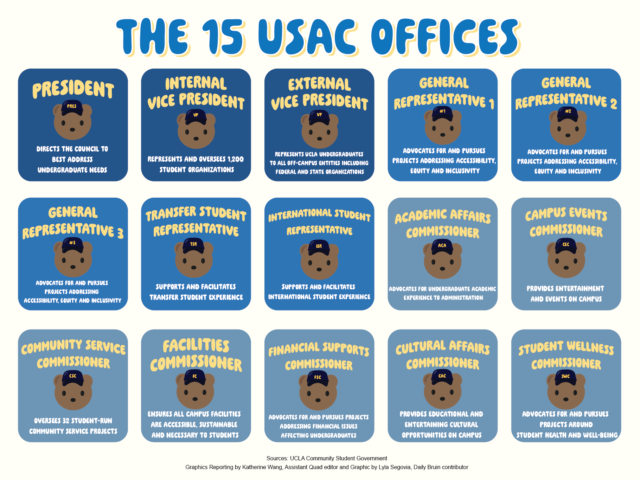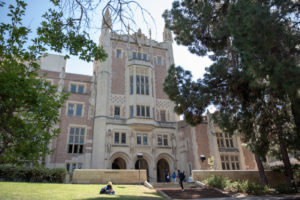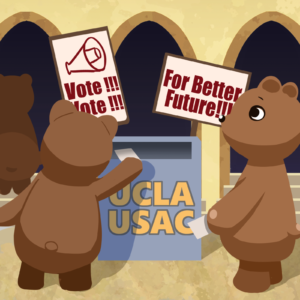This post was updated May 6 at 12:05 p.m.
Bruins will vote for next year’s Undergraduate Students Association Council during a weeklong voting period starting Friday.
Twenty-nine candidates, six of whom are current officers, are running for the 15 available positions, which include executive, representative and commissioner roles. The council will be responsible for overseeing and allocating over $10 million in student fees to efforts aimed at facilitating and improving the undergraduate student experience.
“With the 10 plus million dollar budget figure, it’s really important that students are aware of where that money is going and have an input in terms of how it’s spent. That’s an input that you can have by voting in the election and by trying to get involved,” USAC General Representative Chris Ramsey said.
USAC is composed of 15 officers who head distinct offices that work to address different parts of student life. For example, the Cultural Affairs and Campus Events commissions hosted Bruin Bash with performers including Doechii and thủy last September, while the External Vice President’s office represented UCLA students at the Student Lobby Conference to state politicians and legislators in March.
When UCLA was founded in 1919, its student government had eight officer positions. The number and types of positions have fluctuated up to over 20 officers in previous years, but the current 15 positions have remained relatively consistent in recent years, with the transfer student representative position being added in 2014 and international student representative in 2020.
“There is such a diverse student body on campus,” Community Service Commissioner Carolyn Wang said. “I do think there needs to be a wide range of students on council that have different interests and are serving different groups of the community.”
Each officer leads an office of student staff members who work on a voluntary or paid basis, depending on the time commitment and scope of the role. USAC has around 1,000 students working across its 15 offices this year, but this number varies by year and office based on the decisions of elected officers.
Every quarter, around $100 of each students’ tuition goes into the $10 million budget used to pay for the various projects each office takes on, as well as USAC’s administrative staff, elected officers and select student staff. Each elected officer is paid around $14,000 over their one-year term, or minimum wage accounting for 20 hours a week. Approximately 14% of the budget goes to administrative fees which includes officer and student worker stipends among other administrative costs.
More than 90% of the budget comes from referendum fees that are mandated to go to predetermined initiatives or organizations. Currently, there are 14 referendums fees students have voted to pay – ranging from the Ackerman Student Union Fee passed in the mid-1950s that helps maintain ASUCLA facilities to the Bruin Bash Fee passed in 2013 that funds the annual fall concert and Enormous Activities Fair. There are three referendums on this year’s election ballot that students can vote on.
Aside from referendum and administrative fees, the remaining budget goes to the various projects within each office.
“When you have a really driven commissioner – and by proxy, you have a really driven office with set goals, initiatives, expectations for what they want to get completed and get done while engaging with the student body – I feel like that’s where USAC’s potential really comes out of,” USAC External Vice President Javier Nuñez-Verdugo said.
Many of the commissions carry out both regular programming and officer-led initiatives dedicated to specific aspects of student life. For example, Wang said regular programming for the Community Service commission includes planning and hosting UCLA’s annual Volunteer Day, while a project specific to this year was helping students get connected to different community service opportunities for wildfire relief efforts earlier this year.
On the other hand, executive and general representative positions have less specific domains and will carry out platforms based on the elected officer’s campaign. For example, USAC Internal Vice President Josh Garland said one of his platforms during his candidacy was continuing and expanding on basic needs. Allocating around $75,000 to support students facing housing insecurity and hosting the annual Off-Campus Housing Fair were two projects Garland said he continued from previous years.
“This year, we had over 600 attendees to our Off-Campus Housing Fair, and we were able to connect different students to over 15 different property owners, as well as different on-campus organizations that focus on affordable housing,” Garland said.
Ramsey added that he campaigned on five platforms including affordability, career support, summer storage, meal access and USAC accessibility. While most of his platforms have been similar to past general representative platforms, he said working to find accessible and affordable summer storage for students was a new initiative he began.
Nearly $1 million gets distributed across the 15 offices, with some offices distributing these funds directly to student clubs and organizations, USAC President Adam Tfayli said.
Despite the variety of projects and resources available through USAC, Nuñez-Verdugo said these projects are only impactful if students make an effort to get involved.
“We have all these amazing initiatives, but it’s just a matter of making sure that students are informed that these platforms exist and that there are ways to get involved in them, even if they’re not necessarily part of a staff or an internship cohort,” Nuñez-Verdugo said.
But voter turnout has decreased 44% from 2020 to 2024, with more than 80% of the undergraduate population not having a say in how their money is spent and inevitably failing to reap the full benefits of their student government. Without enough concern from more of the student population, USAC officers said the council will not be able to grow and improve in necessary and meaningful ways.
“The fact that there’s room for improvement is exactly why a lot of students should try to get involved and be aware of what’s going on in USAC because there’s so much more that we can do and so much more that we will be able to do if we do have that interest and involvement from our student body,” Ramsey said.





Comments are closed.